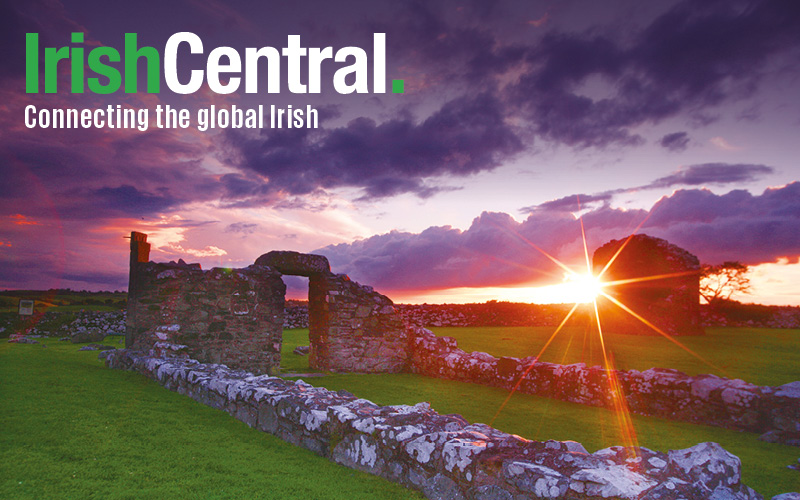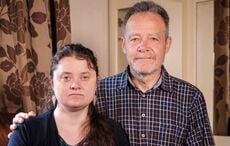Maria de la Soledad Teresa O’Brien’s name is like a bridge across cultures. In Spanish her full name means “The Blessed Virgin Mary of Solitude,” and when she first started working in the media many people quietly suggested she change it.
She refused. Pride in her cross-cultural heritage demanded that she be true to herself. Growing up on the North Shore of Long Island, she had always been Soledad O’Brien, she saw no reason to alter the fact.
“As much as my name is unusual, it aptly describes everything I am,” O’Brien, 42, told the Irish Voice. “I’m a light skinned black girl with fuzzy hair who’s got freckles.
“I think my full name kind of references that all in. I just didn’t want to lose that, and so I really held onto the name.”
Growing up in an all-white neighborhood, O’Brien noticed that none of her friends or neighbors had a problem pronouncing her first name. So people’s own personal biases might be coming through in the suggestions, she felt.
But independence of mind in the face of other people’s sometimes racially tinged suggestions is a characteristic she has inherited from her parents.
When her father, Edward O’Brien -- an Australian of Irish descent -- met her mother Estella, who is Afro Cuban, interracial marriage was still illegal in the state of Maryland, where they were living in 1959, the year they married. But undeterred by other people’s discrimination the young couple travelled to Washington D.C. and over time they produced six children, all of whom graduated from Harvard University.
“I didn’t really learn about my own parents’ story until I was older and asking where they had met and how they had come to find each other,” she said.
“I always knew that my dad’s family all live in Australia and that they all came from Ireland, and that my mom’s family all lived in Cuba and many of them were still stuck there. But the context in which they were married was a mystery until I really started asking questions about it.”
What O’Brien discovered would have shocked anyone. First though, she learned about the sweet natured courtship that began her parents’ love affair.
“As students at John Hopkins in Maryland they used to both go to daily Mass. My father would ask her every day if she would like a ride home, and every day my mother would refuse – you didn’t take a ride from a man you don’t know. But one day she eventually said yes, and that’s how they started dating,” she says.
In 1959 in Maryland interracial dating was frowned upon, at best. The young couple could not be served at bars or restaurants, and most every form of social entertainment was closed to them.
“My mom took just him back to her apartment and made him dinner. One year later, the day after Christmas, the two of them were married,” says O’Brien.
“Their message to us growing up was don’t let things get in your way, just keep moving around and figuring out what you want to do and working around it. The Supreme Court didn’t overturn the ban on interracial marriage until a year after my youngest brother was born – and he was the sixth child. We’re really not so far removed from that era in time.”
Honored by Irish America magazine, theNational Association for the Advancement of Colored People (NAACP) and winner of the Groundbreaking Latina award, it’s obvious that every part of O’Brien’s heritage is proud to claim her.
Says O’Brien, “Every culture sees their own culture in me. I remember my uncle from Australia said, ‘You look so Australian.’ It’s the freckles.
“I look like an O’Brien. If you saw my dad you’d agree. When I was filming Latino in America and I interviewed a wife who was Dominican and her husband who was Puerto Rican and she said, ‘I read you’re mother’s Cuban, I knew you were one of us!’
“I love that in the black community that people consider me to be someone who contributes on all fronts. There’s something very nice about being an insider and an outsider. As a journalist I think there’s a plus to that.”
Has she ever been to Ireland? “I have actually! I was asked in the past to give speeches in Dublin so I’ve only been there so far. I loved it.
“My husband loves Ireland too -- his father is Scottish and he’s been to the countryside there a lot. As our kids get older we are dying to go and to bring them, to show them their heritage.”
O’Brien is married to banker Bradley Raymond. They have four children, two daughters and twin sons.
In situations where other people wonder if they fit, O’Brien feels she never fits 00 so ironically she always fits.
“Whether it’s working moms, or Afro Caribbeans, or Latinos or Irish people or Australians, you can see the inside story and the outside one.”
But growing up, O’Brien did not at first see the value of her cross-cultural background.
“It didn’t feel cool. When I was a teenager I had a freakish name and big poufy hair that didn’t do what anybody else’s hair did and I was part of family who didn’t blend in. It was hard,” she recalls.
O’Brien this week will premiere her remarkable CNN documentary Black In America 2 (the original broadcast, Black in America, seen last summer, attracted an astounding 16 million viewers, one of the largest audiences ever for a seasonal documentary). Is she nervous?
“Last year there was tons of word of mouth. I mean, tomorrow night (Wednesday, July 22) we’ll do a live pre-show,” she says.
“But you know what’s funny? When you do a documentary it’s done. You pop it in and you hit play and you hope people will appreciate and respond to the months and months you put into it.
“It’s a very different feel to when Anderson Cooper and I were doing the Michael Jackson memorial. There’s a very different sense. We’ll be watching it like other viewers and all my friends will be watching too.”
For the new documentary O’Brien has criss-crossed the U.S., including reports from Ghana and South Africa, as she uncovers the people and programs at the forefront of change in the African American community.
“There’s a spectrum, a continuum of different stories out there to tell about people who go on to become president of the U.S. and people who are trying to overcome poverty and discrimination and then there’s a whole range in between,” she says.
“Those are all a part of what it means to be black in America. I want to highlight the young leaders who are making a difference.”
As for her famous colleague on CNN, Anderson Cooper, O’Brien’s admiration is heartfelt.
“I love him. We worked together on the election and the inauguration and he’s just exactly as he is on TV. A great guy, very funny and self-deprecating,” she says.
“Someone was auctioning off lunch with Anderson so I bought it! I had to pay money to have lunch with that man. I’m a busy person, but he’s insane.”
A final word on Black in America 2 from O’Brien: “I think there are so many stories of the African American experience -- and tonight’s will be just a tiny sliver. But these are communities I feel very connected to and these are people I love.”
Black in America 2: Tomorrow's Leaders will air on Wednesday, July 22 at 9 p.m., and Thursday, July 23 at 8 p.m. A countdown show will air live on Wednesday from 7-8 p.m.




Comments